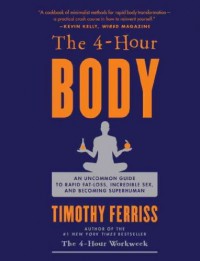A geek's guide to physical awesomeness: The 4-Hour Body by Timothy Ferriss

Thinner, bigger, faster, stronger... which 150 pages will you read? Is it possible to: Reach your genetic potential in 6 months? Sleep 2 hours per day and perform better than on 8 hours? Lose more fat than a marathoner by bingeing? Indeed, and much more. This is not just another diet and fitness book. The 4-Hour Body is the result of an obsessive quest, spanning more than a decade, to hack the human body. It contains the collective wisdom of hundreds of elite athletes, dozens of MDs, and thousands of hours of jaw-dropping personal experimentation. From Olympic training centers to black-market laboratories, from Silicon Valley to South Africa, Tim Ferriss, the #1 New York Times bestselling author of The 4-Hour Workweek, fixated on one life-changing question: For all things physical, what are the tiniest changes that produce the biggest results? Thousands of tests later, this book contains the answers for both men and women. From the gym to the bedroom, it’s all here, and it all works.
In other words, a guidebook for physical awesomeness. But does it work?
In the interest of full disclosure I have to point out that I have not read this entire book, but I've read enough to form an opinion and I want to get it off of "now reading" status because it's the kind of book that you read sections of and refer to occasionally. This is okay. Timothy Ferriss, the author, even recommends at the beginning to not read it all the way through. Just read the bits that interest you. This makes sense because The 4-Hour Body: An Uncommon Guide to Rapid Fat-Loss, Incredible Sex and Becoming Superhuman covers topics as disparate as (you guessed it) rapid fat-loss, incredible sex and becoming superhuman, among other things. These topics, though, aren't as disparate as they seem though because Ferriss' whole deal is about "hacking the human body" and achieving maximum results with a minimum of effort through the magic of science and thinking outside of the box.
The topics he covers are: subtracting fat, adding muscle, improving sex (and for the ladies, the 15 minute female orgasm!), perfecting sleep, reversing injuries, running faster and farther, getting stronger, swimming and living a longer and better life. That's a lot of stuff and there are some pretty outrageous promises, but Ferriss provides scientific data for his methods. While I can't say that Ferriss' work would stand up to the scrutiny of a review board, much of what he says falls in line with my own experience and with what I have read elsewhere (regarding diet, fat loss and muscle and strength gains. I unfortunately don't have anything to say about the "incredible sex" portion). Ferriss' writing is easy and entertaining and he separates the hard science bits from the main text so you may skip or study at your leisure. He sure doesn't skimp on the personal details (weight, color and consistency of his stool? Gross.) but it's all in the name of science.
Overall, reviewing this as a book, it's an interesting and enjoyable read. Ferriss' authorial voice is conversational and he freely interjects humorous anecdotes of his unusual quest for the body hack (like weighing food at a restaurant with a mini-scale pulled from his "man purse"--while on a first date with someone. I don't think it went well). I think anyone with any goals or interest relating to the topics covered would probably get something out of it. As far as reviewing the methods in the book, well that takes some experimenting. I may have to just buy this book (it's on loan from the library right now) because there's a lot of stuff here that I want to explore. So I can't review his methods in terms of chance of success, although much of the science seems reasonable to my layperson's brain.
Since I've packed on an extra 15 lbs in the past year (due to laziness--I refuse to use aging as an excuse) I am right now trying his almost ridiculously easy-to-follow "slow-carb" diet. It's the first thing in the book and I imagine probably the most used part of the book for most people. So far so good, although my experience is not as dramatic as Ferriss claims the diet can be. Ferriss makes the claim that 20 pounds can be lost in 30 days. So that's about 5 pounds a week, right? Understand that fat loss is not necessarily an isometric progression, but going by this, on average, say, it's about 5 pounds a week. Also understand that fat loss is also partially dependent on your other body systems and make up. I have no doubt that 5 lbs per week is possible, safe and expected for very obese individuals, but for the only slightly overweight one's expectations should be rather more modest. So for me, it's slower going. My excess is not so dramatic and I have to admit that I'm not a good test subject, being lax on my compliance. He allows two glasses of dry red wine a day. I think perhaps I am a bit too generous with the definition of a "glass." Or the number "two."
Anyway, the point is there is a lot of interesting material in The 4-Hour Body and it encourages one to research and use scientific method and experiment to find the most efficient means to accomplish your goals. Why starve yourself if you can east reasonably and still lose weight? Why overtrain yourself silly to add 50 lbs to your deadliest when there are easier ways? Sure, maybe not everything in The 4-Hour Body works as advertised for everyone, but I think the point is to embrace the pioneer spirit of scientific experimentation.
Now if I can only find some test subjects for that 15-minute female orgasm thing…
 1
1



